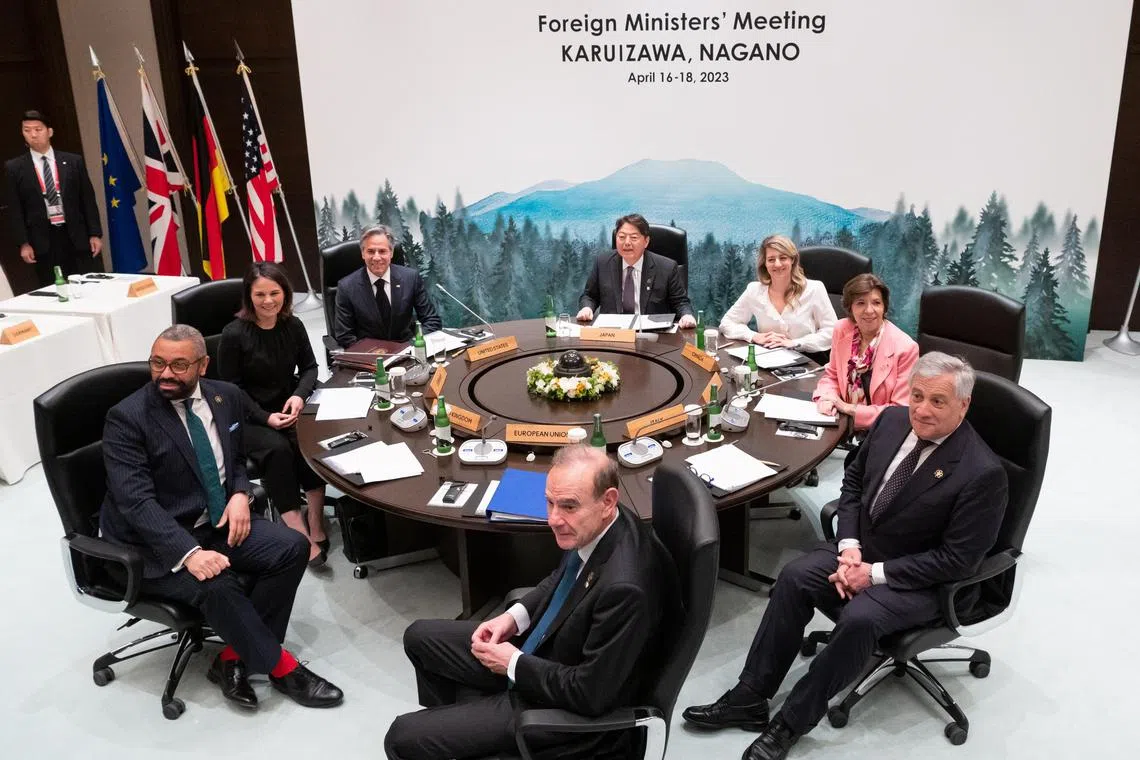G-7 ministers stress unity amid tensions with China and Russia
Sign up now: Get insights on Asia's fast-moving developments

The G-7 foreign ministers at the start of the fifth working session in Karuizawa, Japan, on Tuesday.
PHOTO: EPA-EFE
KARUIZAWA, Japan - The Group of Seven (G-7) industrial powers on Tuesday said it was more united than ever, as it criticised China’s added pressure on Taiwan
“The strength of the solidarity between the G-7 foreign ministers is at a level not seen before,” Japan’s Foreign Minister Yoshimasa Hayashi said at a press conference after hosting a meeting of the group in the Japanese resort town of Karuizawa.
The show of unity comes after French President Emmanuel Macron in April said the European Union should reduce its dependency on the United States
German Foreign Minister Annalena Baerbock, who also attended the meetings in Japan following a visit to Beijing, underscored that her country would not compromise on its values when it comes to engaging with China.
“I made clear in China: We want to cooperate, we want to be partners, but we are not naive,” she told reporters in Japan.
Beijing, which views Taiwan as a renegade province to be reunified, by force if necessary, rebuffed the G-7 comments as gross interference in its internal affairs.
The G-7 communique highlights how the issues of Russian military intervention and fears of similar action by China against Taiwan have been a focus of the three-day meeting.
The group, which comprises the US, Japan, Germany, Britain, France, Italy and Canada, described Russia’s threat to put nuclear weapons in Belarus as “unacceptable”.
It said “any use of chemical, biological or nuclear weapons” in Ukraine “would be met with severe consequences”.
Russian President Vladimir Putin in March said Moscow would station shorter-range, so-called tactical nuclear weapons in Belarus because the Nato military alliance was expanding towards Russian borders.
In a bid to limit Moscow’s ability to wage its war, the G-7 ministers in their communique also warned other nations, which the US and other Western nations worry could include China, not to supply Russia’s armed forces.
“We will reinforce our coordination to prevent and respond to third parties supplying weapons to Russia,” they said.
US Secretary of State Antony Blinken in March said China had not yet supplied Russia with lethal aid, but US officials are concerned about dual-use products, such as electronics components that can be used in missiles and other weapons.
Taking direct aim at China, the ministers also agreed that peace and security in the Taiwan Strait were critical, and opposed militarisation of the South China Sea. They called on Beijing to act.
“We remind China of the need to uphold the purposes and principles of the UN Charter and abstain from threats, coercion intimidation and the use of force,” the ministers said in the document, which included a condemnation of missile launches from North Korea, as well as expressed concern about developments in Myanmar, Afghanistan and Iran.
China’s Foreign Ministry spokesman Wang Wenbin said the G-7 communique grossly interfered in the country’s internal affairs, as well as maliciously smeared and discredited it.
The statement was “full of arrogance, prejudice against China”, Mr Wang told a regular media briefing in Beijing, adding: “We have made a strong demarche to the host Japan.” REUTERS, BLOOMBERG


